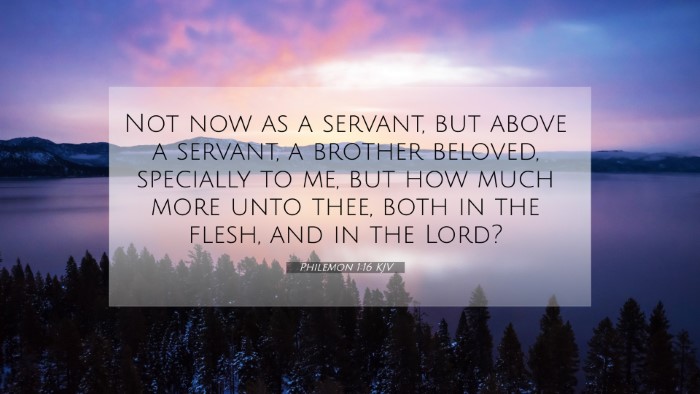Understanding Philemon 1:16
Philemon 1:16 states: "No longer as a slave, but more than a slave, as a beloved brother, especially to me, but how much more to you, both in the flesh and in the Lord." This verse is crucial for understanding the apostle Paul's perspective on the relationship between Onesimus, a runaway slave, and his master, Philemon.
Contextual Background
This letter from Paul to Philemon addresses a delicate situation regarding Onesimus, who had fled from Philemon but had since converted to Christianity. Paul implores Philemon to accept Onesimus not merely as a slave but as a valued brother in Christ.
Thematic Insights
- Transformation and Redemption: Onesimus symbolizes the transformative power of the Gospel, moving from a status of a slave to that of a beloved brother.
- Christian Brotherhood: Paul emphasizes the theme of unity in Christ transcending social and economic barriers.
- Forgiveness: This verse invites readers to reflect on their call to forgiveness and new relationships built under Christian values.
Cross-References
Philemon 1:16 connects with several other verses in scripture that highlight similar themes of brotherhood, equality in Christ, and the call to love:
- Galatians 3:28 - “There is neither Jew nor Greek, slave nor free, male nor female, for you are all one in Christ Jesus.”
- Ephesians 6:9 - “And, masters, do the same to them, and stop your threatening, knowing that he who is both their Master and yours is in heaven, and that there is no partiality with him.”
- Colossians 3:11 - “Here there is not Greek and Jew, circumcised and uncircumcised, barbarian, Scythian, slave, free; but Christ is all, and in all.”
- Romans 8:17 - “And if children, then heirs—heirs of God and fellow heirs with Christ...”
- 1 Corinthians 12:12-13 - “For just as the body is one and has many members, and all the members of the body, though many, are one body, so it is with Christ.”
- 2 Corinthians 5:16 - “From now on, therefore, we regard no one according to the flesh.”
- 1 Peter 2:17 - “Honor everyone. Love the brotherhood. Fear God. Honor the emperor.”
Commentary Insights
The commentaries of Matthew Henry, Albert Barnes, and Adam Clarke offer rich interpretations that delve deeper into this verse:
- Matthew Henry: Highlights the importance of viewing all within the body of Christ as brothers and sisters, stressing the spiritual implications of brotherhood.
- Albert Barnes: Points out that Paul elevates the status of Onesimus, indicating that all believers will one day be treated as equals in the eyes of God.
- Adam Clarke: Emphasizes the personal relationship Paul has with both Philemon and Onesimus, arguing that acceptance is rooted in familial love.
Application and Reflection
In modern contexts, Philemon 1:16 challenges believers to break down societal barriers and adopt a posture of grace toward those who may have previously wronged us. This scripture invites a self-reflective examination of how we treat others, especially those from backgrounds that might differ from our own.
Bible Study and Cross-Referencing Techniques
For those interested in deeper analysis, several tools for Bible cross-referencing can aid in the study of this verse:
- Bible Concordance: Useful for finding related themes across scripture.
- Cross-Reference Bible Study: Guides to discover connections between verses through thematic links.
- Bible Reference Resources: Tools that help in further understanding inter-Biblical dialogues.
Conclusion
Philemon 1:16 goes beyond a personal appeal; it serves as a profound reminder of the ethos of Christianity, centered on love, forgiveness, and brotherhood. As Paul advocates for Onesimus, we too are challenged to recognize the inherent value of every individual in the body of Christ, leading to a richer, more inclusive faith experience.


